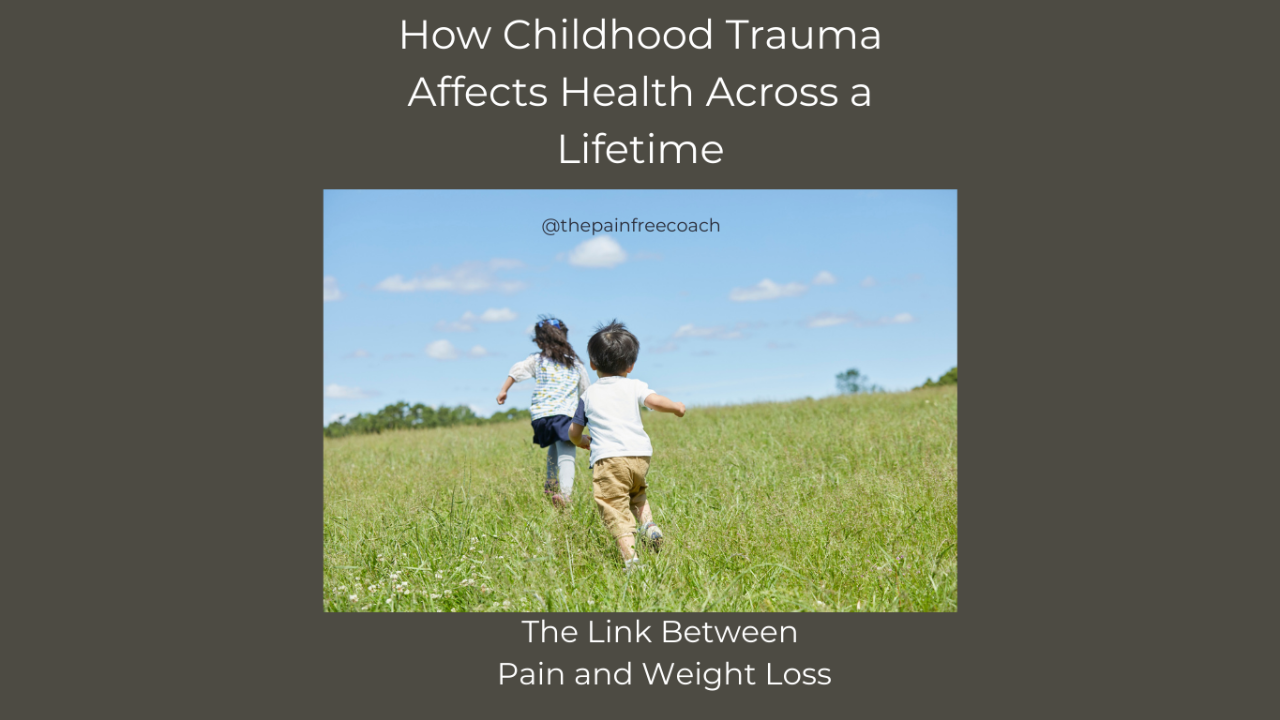How Childhood Trauma Affects Health Across a Lifetime: The Link Between Pain and Weight Loss

When we think about childhood trauma, many people imagine dramatic events like abuse or neglect. But trauma often comes in subtler forms: constant criticism, emotional neglect, or learning that your feelings are “too much.” These experiences shape your nervous system from a young age, and over time, can affect both body image and pain patterns in ways most women don’t realize.
For those wondering, signs of repressed childhood trauma in adults can include chronic pain, fatigue, perfectionism, emotional eating, self-criticism, hypervigilance in relationships, difficulty expressing emotions, or struggling with body confidence.
Childhood Trauma and the Nervous System
Trauma isn’t just about what happened. It’s about how your body experienced it. When a child feels unsafe, their nervous system activates protective mechanisms: fight, flight, or freeze.
-
A child who hides from conflict may develop a freeze response, which can later appear as chronic tension, pain, or fatigue.
-
A child who appeases or people-pleases to avoid punishment may carry body shame and self-criticism.
-
Children exposed to unpredictable anger, substance abuse, or emotional neglect may develop hypervigilance, making them more sensitive to pain and prone to stress-related illnesses.
Many women struggle with all of these, and these patterns shape how your body and nervous system respond as an adult. They affect posture, muscle tension, digestion, and even how you process emotions.
The Pain-Body Image Connection
Pain and body image are deeply interconnected.
-
Pain can distort body perception. Chronic pain may make you feel weak, flawed, or unworthy.
-
Negative body image can intensify pain. Harsh self-judgment triggers stress hormones, increasing inflammation and tension.
-
Both are linked to trauma responses. Childhood experiences that taught you not to express emotions can make it difficult to relax or feel safe in your own body, contributing to long-term pain and discomfort.
For instance, a woman who learned to hide anger as a child may carry tension in her back and shoulders. She may feel ashamed of her body and be fearful of the way people see her, which increases fatigue and reinforces a cycle of pain and self-criticism.
Emotional Patterns That Connect Pain and Body Image
A common cycle looks like this:
-
Childhood Trauma: Fear, shame, or emotional suppression teaches the body to protect itself.
-
Nervous System Dysregulation: Fight, flight, or freeze responses become habitual.
-
Pain and Discomfort: Muscles tighten, posture shifts, and stress hormones rise.
-
Body Image Struggles: Shame and self-criticism grow because the body feels “wrong.”
-
Behavioral Responses: Overeating, restrictive dieting, or overexercising emerge to cope.
-
Feedback Loop: These behaviors reinforce shame, dysregulation, and chronic pain, keeping healing out of reach.
This is why women often feel stuck in pain, fatigue, and body dissatisfaction, even when they’re following diet and exercise routines. Women often feel unworthy of achieving their goal weight, or get to their goal weight and immediately start self-sabotaging and gain the weight back.
Healing the Connection
Healing both pain and body image starts with reconnecting with your body and regulating your nervous system:
-
Somatic Awareness: Notice where tension lives. Simply acknowledging it helps release stress.
-
Mindful Movement: Gentle yoga, Pilates, or walking strengthens the body while calming the nervous system.
-
Body Image Affirmations: Say, “My body is my ally. I am learning to listen and care for it,” or “Every sensation in my body is meaningful and safe to feel.”
-
Mindful Eating: Pay attention to hunger and fullness cues. Recognize emotional triggers for food instead of ignoring them.
-
Professional Support: Techniques like Somatic Coaching, Pain Reprocessing Therapy (PRT), and Emotional Awareness and Expression Therapy (EAET) can help release pain and trauma without reliving it.
By practicing these strategies, you interrupt the cycle of shame, tension, and chronic pain, and restore trust in your body.
Listening to Your Body
Understanding how childhood trauma affects health across a lifetime isn’t about blame; it’s about recognizing patterns that no longer serve you and learning to heal.
Wanting to lose weight or feel stronger is natural, but how you approach it makes all the difference. When you reconnect with your body, honor its signals, and process emotions safely, you can reduce pain, improve body confidence, and create lasting change.
You are not broken. You are learning to listen to your body, honor its wisdom, and step into a life of more ease, vitality, and self-compassion.
If you want to explore how this work applies to your unique story, I’d love to invite you to schedule a free call.
Every woman’s nervous system, weight loss journey, and symptoms are different, and this is deeply personal work.
Together, we can start to untangle the patterns that are holding you back and create new ones that support healing.
I believe in you,
💙 Katie

